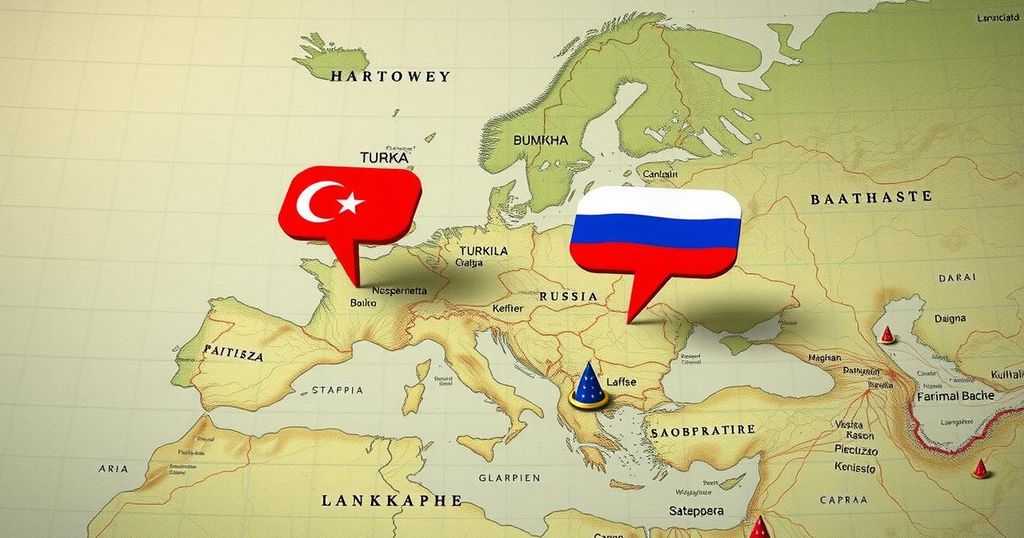Geopolitical Shifts: Turkey and Russia’s Maneuvers in Syria Post-Assad

The downfall of Bashar Assad has prompted strategic geopolitical shifts between Turkey and Russia, favoring Turkey’s standing while diminishing Russia’s influence. The relationship between Putin and Erdogan remains complex, marked by competition and cooperation over regional interests. Economic ties persist amidst geopolitical tensions in Syria and Ukraine, influencing both nations’ future engagements.
The recent downfall of Syrian President Bashar Assad has sparked a complex series of geopolitical adjustments between Russia and Turkey. The transition of power in Damascus appears to favor Turkey, whose backing of rebel forces has resulted in significant gains. This shift has potentially weakened Russia’s standing on the international stage, leading analysts to suggest a re-evaluation of alliances in the region, particularly noting that “in the game of Czars vs. Sultans, this is Sultans 1 and Czars 0” – Soner Cagaptay.
The close relationship between Turkish President Recep Tayyip Erdogan and Russian President Vladimir Putin has historically included collaboration despite underlying competition. Both leaders have publicly praised each other while negotiating their respective national interests in a variety of geopolitically significant regions, including Ukraine and Libya. Erdogan recently stated, “There are currently only two leaders left in the world — there is me and there is Vladimir Putin,” indicating a respect for Putin’s influence.
Turkey and Russia historically backed opposing factions in the Syrian civil war, which began in 2011. Their rivalry escalated drastically following Turkey’s downing of a Russian warplane in 2015, leading to economic sanctions from Russia against Turkey. Erdogan eventually sought to mend ties to mitigate the adverse economic impacts, while cooperation resumed with a ceasefire agreement regarding Idlib province in 2018 and subsequent negotiations over conflict zones.
Despite concurrent collaboration in Syria, both nations vied for dominance in Libya and exerted influence in other regional conflicts, notably seeking to improve relations with former Soviet states. The invasion of Ukraine in 2022 transformed their relationship dynamics, as Turkey became a crucial economic bridge for Russia amid severe sanctions from the West.
Erdogan supported Ukraine’s territorial integrity while navigating a diplomatic stance that allowed him to mediate between Russia and Ukraine. Collaborative efforts included the hosting of peace talks and Turkey’s role in negotiating grain export agreements from Ukraine. Turkey’s economic reliance on Russian resources complicates their geopolitical positioning, especially as Russia’s influence wanes due to its focus on the war in Ukraine.
The constrained Russian military and diplomatic capacity in Syria—exacerbated by diminishing support for Assad from Hezbollah and Iranian forces—has created a vacuum that Turkey-backed rebels have exploited. Although Russia has aimed to maintain some influence through negotiations, direct engagement has been hindered by Assad’s refusal to cooperate. Putin’s recent comments suggest that Russia is exploring options for continuing its military presence in Syria, despite the new political order.
As the situation evolves, some analysts predict that Turkey might adopt a firmer stance against Russia, particularly if U.S.-Turkey relations improve. Erdogan’s approach will depend on how the U.S. aligns with Kurdish groups in the region. Putin acknowledged Turkey’s interests in border security but warned of potential Kurdish resistance to Turkish military actions. Experts note that despite the challenges, economic ties between Russia and Turkey will remain critical, providing a foundation for both nations to navigate their complex relationship.
In light of Assad’s fall, Turkey has gained leverage in the geopolitical landscape, diminishing Russia’s previous influence in Syria. The future of Turkish-Russian relations will hinge on the interplay of military actions and economic partnerships, particularly in Ukraine and Syria. The intricate balance of power remains vulnerable, as Turkey strategizes its position based on evolving alliances and U.S. relations. Despite setbacks, both nations are likely to maintain engagement due to interlinked economic interests.
Original Source: apnews.com







